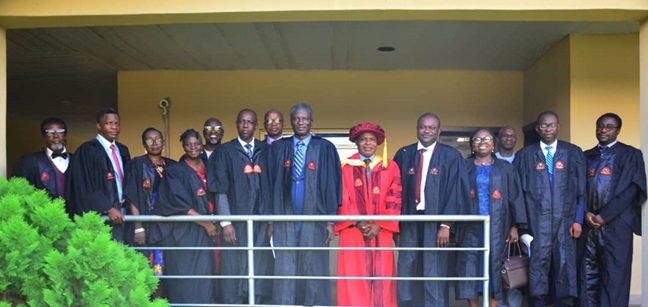Olufemi Alabi, a Professor of Animal Science, College of Agriculture, Engineering and Science, Bowen University, Iwo, Osun State, has described good welfare of livestock as inevitable to boost their productivity and suitable for human consumption.
Professor Alabi made the remark while delivering the 13th edition of Bowen University’s inaugural lecture held recently.
Alabi, in his inaugural lecture, entitled ‘Animal and Us, That All May Live Well: The Quest for Animal Welfare’, noted that domestic animals played a vital role in the development of and sustenance of human society in the areas of food production, transportation, income generation and so on, adding that animals and humans are inseparable.
According to him, good animal welfare entailed good health and nutrition and comfortable living conditions, saying that animal welfare practices that reduce stress and ensure proper animal husbandry could lead to a decrease in the transmission of disease among the animals.
He emphasized that knowledge about the environment and how it affects the animal’s performance and well-being is very important, noting that the housing environment for animals plays a crucial role in determining the welfare of animals in various production systems.
Professor Alabi asserted that the greatness of a nation and its moral progress can be judged by the way its animals are treated, as he urged livestock farmers and animal handlers to take good care of their stock, noting that farm animals must not be slaughtered with cruelty.
ALSO READ: 400-level law student emerges Bowen varsity’s one-day VC
The don added that the smuggling of frozen poultry products into Nigeria is a significant issue with various underlying causes and implications for the local poultry industry.
According to him, imported frozen poultry products often came at a lower price compared to locally produced ones. This price difference, he said, created a high demand for smuggled goods. He noted that Nigeria’s porous borders made it easier for smugglers to bring in illegal poultry products. He stated that the local poultry industry, sometimes, cannot meet the demand, creating a gap that smugglers exploit. “Economic challenges, such as high production costs and inadequate infrastructure, make locally produced poultry more expensive. Corruption among border officials can facilitate smuggling activities.
“The local poultry industry suffers significant financial losses due to competition from cheaper, smuggled products. This undermines local producers’ ability to invest and expand. “Smuggled poultry products often bypass health and safety inspections, posing risks of diseases such as avian influenza. These products may be stored and transported under substandard conditions, leading to potential health hazards for consumers.
“Dependence on smuggled products can undermine national food security. If the smuggling routes are disrupted, it could lead to shortages. The local poultry industry’s struggles result in job losses for those employed in production, processing, and distribution.
“The government loses revenue from import duties and taxes due to the illegal nature of these imports.”
Professor Alabi, in his recommendation, enjoined the government to improve the surveillance and security at borders to prevent smuggling activities, providing subsidies, training, and resources to local poultry farmers to increase production efficiency and reduce costs.
There is a need to educate consumers on the risks of consuming smuggled poultry and the benefits of supporting local products, and also to ensure that regulations against smuggling are strictly enforced, including penalties for those involved. Investing in better storage and transportation, he opined.
Continuing, the don added that there is a need for infrastructure support to reduce post-production losses and lower the cost of local poultry products, adding that awareness creation about animal welfare and animal rights in Nigeria’s livestock production requires a multifaceted approach that engages various stakeholders, including farmers, consumers, policymakers, and the general public.
“Addressing the smuggling of frozen poultry products as a matter of necessity is crucial for the sustainability and growth of Nigeria’s poultry industry, public health, and overall economic stability.
While speaking, the Vice Chancellor of Bowen University, Professor Jonathan Babalola, congratulated Professor Alabi for delivering the 13th inaugural lecture of the university, stating that taking good care of livestock helps human beings to better their lives. According to him, animals are indispensable to humanity.




